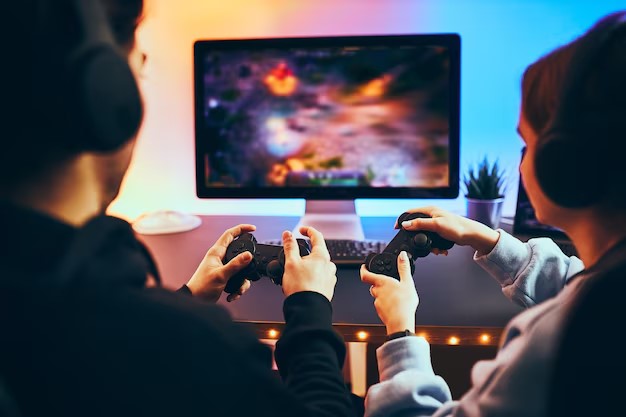Game
The Psychology Behind Why We Game: What Keeps Online Gamers Hooked?


Gaming has grown from a niche hobby to a global phenomenon, and online gaming is at the heart of this transformation. Whether it’s battling monsters in role-playing games (RPGs), competing with friends in multiplayer arenas, or even trying luck in online games, millions of people are drawn to the screen daily.
But what keeps us coming back for more? The answer lies in a mix of psychology, technology, and good old-fashioned fun.
In this article, we’ll explore the psychological factors that hook online gamers and why gaming has become such an integral part of modern entertainment.
The Role of Instant Gratification in Gaming
One of the biggest appeals of gaming is the promise of instant rewards. In a world where patience is often tested, instant gratification is a powerful motivator.
When you complete a level, unlock a rare item, or hit a jackpot in online games, the immediate feedback triggers a dopamine rush. This “feel-good” hormone keeps players engaged and eager to repeat the experience. Gamers feel a sense of achievement with every small win, making it hard to log off.
How Game Developers Use Rewards
Game developers are masters at creating reward systems that captivate players. For example:
- Daily rewards: Many games offer incentives for logging in daily.
- Loot boxes and treasure chests: These create excitement because of their unpredictable nature.
- Progress bars and achievements: They show measurable growth, which players find motivating.
By offering frequent and varied rewards, slot games tap into our natural desire to succeed and be recognized.
The Social Element: Gaming Is Better Together
Human beings are social creatures, and gaming often provides an opportunity for connection. The rise of multiplayer online games has made it easier than ever to team up with friends or meet new people from around the world.
Building Communities
Games like Fortnite, Call of Duty, and Among Us thrive because they create social bonds. Players often:
- Join guilds or clans to tackle challenges as a team.
- Use in-game chat and voice features to strategize and socialize.
- Attend virtual events or tournaments, blurring the line between gaming and real-world interaction.
These shared experiences strengthen relationships, making gaming more than just a pastime. For many, it’s a way to feel connected in an increasingly digital world.
Escapism: A World Away from Reality
Life can be stressful, and gaming offers a much-needed escape. Immersive titles like Skyrim or The Sims let players dive into fantasy worlds where they can be anyone and do anything.
Escapism isn’t inherently bad. In fact, it can be therapeutic when used in moderation. Games allow us to temporarily leave behind the worries of daily life, offering a space to relax and recharge.
Why Immersion Works
Game developers design rich, detailed worlds that feel alive. Factors like:
- Realistic graphics
- Engaging storylines
- Customizable characters
All work together to pull players deeper into the experience. This immersion makes it easy to lose track of time, which is why many gamers joke about “just one more level” turning into an all-night session.
The Thrill of Competition and Mastery
Gamers love a challenge, and the feeling of mastering a game is incredibly satisfying. Whether it’s beating a difficult boss or climbing the ranks in an online leaderboard, competition drives many players to keep improving.
Skill Development in Gaming
Contrary to the stereotype of gaming as a mindless activity, many games require critical thinking, quick reflexes, and strategic planning. Titles like Chess.com or StarCraft are prime examples of games that enhance cognitive skills while keeping players hooked.
Even casual games like Candy Crush involve problem-solving, which keeps your brain engaged while providing a sense of accomplishment.
How Free-to-Play Models Keep Us Coming Back
Many games today are free to download, but they make money through microtransactions—small purchases for in-game items, skins, or upgrades. The low barrier to entry gets players hooked, while the temptation to spend “just a little” adds up over time.
Free-to-play games often:
- Offer limited-time events to create urgency.
- Use premium currencies to make items feel exclusive.
- Introduce challenges that encourage players to invest time (or money) to progress.
This model keeps players engaged while making gaming accessible to a wide audience.
What Does the Future Hold for Gaming?
As technology evolves, gaming will only become more immersive and interactive. Virtual reality (VR) and augmented reality (AR) are already pushing the boundaries, offering experiences that feel closer to real life.
However, the psychology behind gaming is unlikely to change. Humans will always seek entertainment, connection, and a sense of achievement—all of which gaming provides in spades.
Final Thoughts
Gaming isn’t just a hobby; it’s a blend of psychology, art, and technology that appeals to our deepest desires. From instant gratification to social bonding and the thrill of competition, the factors that keep us hooked are as diverse as the games themselves.
Understanding these elements can help us game responsibly and enjoy this incredible medium to its fullest. So the next time you pick up a controller or swipe your phone screen, remember—it’s not just a game; it’s science in action!


-



 Quotes5 years ago
Quotes5 years ago125 Inspirational Car Quotes and Captions to Celebrate Your New Car
-



 Growth5 years ago
Growth5 years ago188 Deep Hurt Quotes with Images
-



 Quotes4 years ago
Quotes4 years ago148 Romantic Love Quotes for Her from the Heart
-



 Quotes4 years ago
Quotes4 years ago164 Relationship Goals Quotes for New Couples Expecting a Long Lasting Relationship
-



 Quotes4 years ago
Quotes4 years ago185 Cute Boyfriend Quotes for the Guy You Love
-



 Quotes4 years ago
Quotes4 years ago141 Best Heart Touching Quotes about Love, Life, and Friendship
-



 Quotes4 years ago
Quotes4 years ago134 Time Flies Quotes for the Unforgettable Moments
-



 Quotes4 years ago
Quotes4 years ago122 Inspirational Kite Quotes That’ll Make You Wanna Fly Right Now





